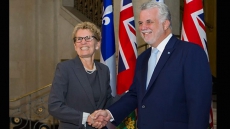The second stage of the federal government's race to pass a bill governing prostitution by the end of the year begins today.
The Senate legal and constitutional affairs committee is set to start hearings into Bill C-36, which proposes to change the rules that surround buying and selling sex in Canada.
The new law was introduced in June, after the Supreme Court struck down Canada's existing prostitution laws as unconstitutional. The high court gave lawmakers until December to establish a replacement.
The law went through a special sitting of the House of Commons justice committee earlier this summer and though the Commons still hasn't voted on the bill, the Senate committee is embarking on a study of its own, lining up close to four dozen witnesses to speak over the course of three days.
Among those set to testify this week is Jean McDonald, who works at Maggie's Toronto Sex Workers' Action Project.
She also appeared before the Commons and said she felt the first hearings were stacked against people whose lives will actually be affected by the bill.
She's not optimistic about the second round.
"It's not pointless but I don't feel like we are going to be listened to by the Conservative government," she said.
"I don't think that our concerns with the bill are being taken seriously."
The Supreme Court struck down Canada's old prostitution law last year because it exposed sex workers to undue risks which the court found constituted a violation of their basic Charter right to security of the person.
The Conservatives responded with the new bill, which creates new offences for clients and pimps, but does not generally criminalize prostitutes themselves.
One exception to that rule had been a provision in the first draft of the bill that made it a crime to communicate to sell sex in a public place where children might be found.
Concerns that the wording of that section was vague enough to prompt a second Charter challenge led to an amendment at the Commons committee.
It specifies that communicating to sell sex next to a school, playground or daycare centre will be illegal.
But opposition to the bill remains widespread, with many arguing that any legislation that turns sex workers into criminals violates the Supreme Court ruling.
The Conservatives have acknowledged they expect the new bill to face further judicial scrutiny, but haven't explained in what way.
Justice Minister Peter MacKay is the first witness expected to testify Tuesday.
He told the Commons in July that decriminalizing prostitution was never an option.
"The government does not accept the proposition that prostitution is inevitable and therefore that we must decriminalize and regulate it. This is not the position," MacKay said.
"On the contrary, the government maintains that prostitution's inherent harms and dangers would only grow and be exacerbated in a regime that perpetrates and condones the exploitation of vulnerable individuals through legalized prostitution."
Other opponents of the bill argue that the criminalization of any element of sex work, including going after those who buy sex, further marginalizes prostitutes and puts them in harm's way.





